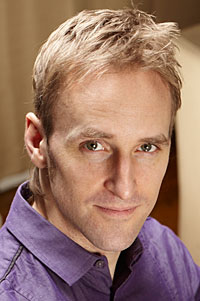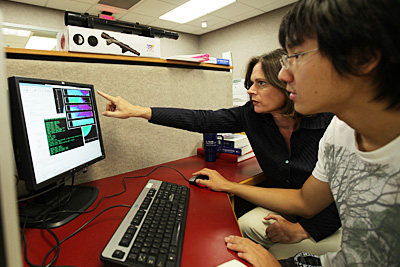The intersection between the liberal arts and emerging technologies that reveal new answers for the way the human brain functions will be the basis for a new speaker series at Lawrence University.
Over the course of the next eight months, five national experts will explore how brain research is connected to various areas of the liberal arts, including religious studies, music, art and literature.

The series, “Liberal Arts in the Century of the Brain,” will incorporate the interdisciplinary areas of neuroscience and cognitive science to create connections with other disciplines at Lawrence by examining questions such as whether the brain processes literary fiction differently than formula fiction or how perception, emotion and cognitive processing impact creative expression.
Edward Vessel, director of the New York University ArtLab and a noted research scientist at NYU’s Center for Brain Imaging, opens the series Wednesday, Sept. 30 at 7 p.m in Steitz Hall of Science 102 with the presentation “Art and Neuroesthetics.” A question-and-answer session follows. The event is free and open to the public.
The emerging field of neuroaesthetics uses neuroscience to study art to determine why certain works of art produce an emotional response. Through the use of neural imaging, Vessel will share recent research that focuses on understanding the basis for how people derive pleasure and inspiration from various art forms and how this may be related to learning, motivation and well-being.
“With the advent of new brain imaging technologies we are able to get better and deeper glimpses of a working brain,” said Nancy Wall, associate professor of biology and of the series’ organizers. “These glimpses not only help us learn how brain function engenders humanistic endeavors but also how such endeavors influence and shape brain function. Or, put another way, ‘this is your brain, this is your brain on the liberal arts.’
“One of the goals of this series is to engage faculty and students across all liberal arts disciplines with what we’re learning about how a brain works,” Wall added, “and with this shared knowledge find new ways to collaborate to enhance liberal learning at Lawrence.”
“This is your brain, this is your brain on the liberal arts.”
— Professor Nancy Wall
Joining Vessel on the series schedule are:
- Richard Davidson, William James and Vilas Research Professor of Psychology and Psychiatry, director of the Waisman Laboratory for Brain Imaging and Behavior and founder of the Center for Investigating Healthy Minds, Waisman Center, University of Wisconsin-Madison, Oct. 29, 11:10 a.m., Lawrence Memorial Chapel.
One of the nation’s leading experts on the neural bases of emotion and emotional style, Davidson will discuss the ways people can change their brains by cultivating habits of mind that will improve well-being, including happiness, resilience, compassion and emotional balance.
- Darya Zabelina, post-doctoral fellow at Northwestern University, February, 2016.Zabelina’s presentation will examine the neural aspects of creativity. Her research focuses on ways of enhancing and fostering the development of creative thinking and problem-solving ability.
- John Iverson, associate project scientist at University of California-San Diego’s Institute for Neural Computation. February 2016.
A cognitive neuroscientist, Iverson will discuss his research on rhythm perception and production in music and language, work that spans behavioral and neuroscience approaches. He is currently overseeing a study of the effect of music training on children’s brain and cognitive development.
- Walter Sinnott-Armstrong, Chauncey Stillman Professor of Practical Ethics in the department of philosophy and the Kenan Institute for Ethics at Duke University. April 12, 2016.
The author of five books and more than 100 published articles, Sinnott-Armstrong is a scholar of moral psychology and brain science, which his presentation will focus on, as well as uses of neuroscience in the legal system.
The “Liberal Arts in the Century of the Brain” lecture series is supported by a $20,500 grant from the New York City-based Andrew W. Mellon Foundation.
About Lawrence University
Founded in 1847, Lawrence University uniquely integrates a college of liberal arts and sciences with a nationally recognized conservatory of music, both devoted exclusively to undergraduate education. It was selected for inclusion in the book “Colleges That Change Lives: 40 Schools That Will Change the Way You Think About College” and Fiske’s Guide to Colleges 2016. Engaged learning, the development of multiple interests and community outreach are central to the Lawrence experience. Lawrence draws its 1,500 students from nearly every state and more than 50 countries.
